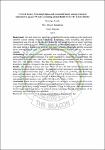| dc.description.abstract | Background: Cervical cancer is a significant global health concern, ranking as the fourth most
common cancer among women worldwide. Fortunately, early screening and effective
management can prevent its progression. However, the uptake of cervical cancer screening
varies across different regions, remaining suboptimal in developing countries such as Uganda.
This study aimed to assess the level of cervical cancer screening uptake and identify associated
factors among women aged 21 to 49 years attending Amach Health Centre in Lira district,
Uganda.
Methodology: A mixed methods approach was employed, combining quantitative and
qualitative data collection techniques. The study included 312 randomly selected women who
participated in face-to-face interviews using structured questionnaires and key informant
interviews with health workers. The data was analyzed using STATA software, including
descriptive statistics, chi-square tests, and logistic regression.
Results: The findings revealed that only 44.8% of the 310 interviewed women had ever
undergone cervical cancer screening. The predictors of cervical cancer screening include: not
being in a marital relationship (Apr: 2.767, 95% CI: 1.463-5.231, p=0.002), poor knowledge
about cervical cancer (Apr: 0.561, 95% CI: 0.374-0.843, p=0.005), not being familiar with
screening modalities (Apr: 0.653, 95% CI: 0.441-0.966, p=0.33), and women whose decisions
were made by their spouses (Apr: 0.510, 95% CI: 0.271-0.961, p=0.05).
Conclusion: About 4 in 10 women had undergone cervical cancer screening by the time of the
study. This study underscores the importance of addressing barriers to cervical cancer screening
in Uganda, particularly among women of reproductive age in rural areas. Recommendations
should target improving access to cervical cancer screening through sensitization of the
community and making services available.
Keywords: Cervical Cancer Screening Uptake, Women, Reproductive Age | en_US |

